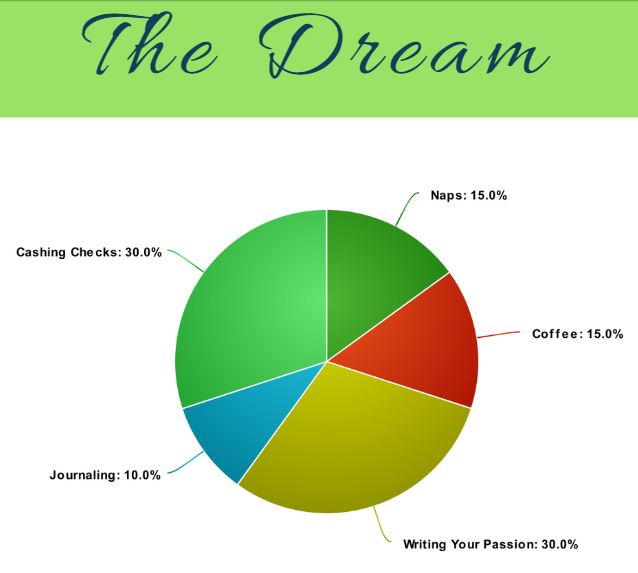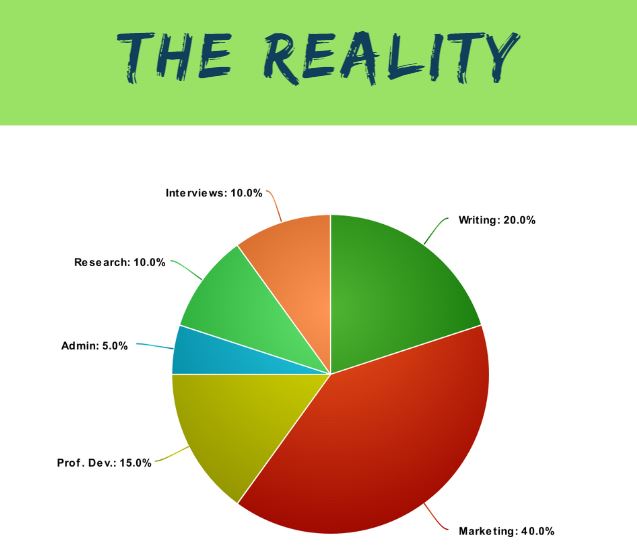 You think you’ve got time management dialed in to be a successful freelance writer.
You think you’ve got time management dialed in to be a successful freelance writer.
But do you really? Be honest.
Go ahead. Cough up an hour-by-hour report of how you spend your time.
It might sound like a frivolous, time-wasting task. You’re too busy, right? Too busy doing what, exactly?
I can almost guarantee the exercise will deliver some serious truth bombs about your time-management skills and commitment to make a living writing.
There’s the made-for-TV dream version of what freelance writers do all day. You know, where you spend like five minutes a day writing.
And then there’s the reality of being a freelance writer (which doesn’t look anything like the dream version of the freelance life).
When you look at your day-to-day activities from a time management perspective, it’s a telltale sign of where your writing career is going…down a dead-end to nowhere, or on a path to move up and earn more.
Here’s how to find out where you’re headed:
What do you do all day, freelance writer?
If you’re struggling to get started or wondering why your freelance career hasn’t taken off, your hour-by-hour playbook should reveal the answer.
Here’s a clue. You’re not going to build a successful freelance career by writing five minutes a day. And if you’re serious about this, you won’t be spending large chunks of time like this either:
- Gallivanting through the countryside
- Shopping in the city
- Pursuing a love interest, or
- Staring out some rain-streaked window of introspection for hours waiting for your muse
But a lot of writers seem to take a laissez-faire approach to freelancing, says freelancer and writing coach Linda Formichelli.
Linda’s recent post on LinkedIn sparked a lively “Dream vs. Reality” conversation about time management for freelancers. Is this how you spend your time?

If you think this is what the freelance life looks like, here’s a few truth bombs about time management to set things straight:
1. Cashing checks takes a few minutes…not hours
Sit around and wait for freelance checks to roll in. Then spend half a day driving to the bank and signing your name in perfect penmanship to cash those checks.
The truth. It doesn’t work like that. Today, lots of clients pay electronically. You can even use a mobile app to cash a paper check with your phone. And if you do need to stop by the bank, the successful freelancer isn’t going to make it an all-day affair.
2. Taking long naps whenever you want rarely happens
It’s no secret that 7 to 8 hours of sleep is ideal for best health, brain function, decision-making, and creativity. And if you need to fit in a nap to make that happen, the freelance life gives you the flexibility.
The truth. If you’re hustling to move up and earn more as a freelancer, you should be willing to sacrifice an afternoon nap to meet a deadline, send a query or letter of introduction, or schedule a call with a prospect to book more work.
3. Obsessing about coffee won’t make you a better writer
Gulp down a cup of Joe and get your caffeine fix. That’s one way to start your day. And if you must, drink another cup or two to keep going until you’ve wrapped up that project on time for a client. But it’s hardly a requirement to be a successful freelance writer.
The truth. Too many writers use coffee as an excuse to waste an entire morning. If you’re a self-described coffee aficionado, you may even refuse to brew your own coffee at home. But if you’re serious about freelancing, you’ll set the timer on the coffee maker in the kitchen to get the most out of your day.
4. Journaling may be therapeutic, but it doesn’t pay
There’s nothing wrong with keeping a journal to document your life, express your feelings, and even work out problems. But if you think journaling is something successful freelance writers spend a lot of time on, think again.
The truth. Journaling doesn’t pay you per word, per assignment, or per hour. It doesn’t pay anthing. Sure, there’s a small chance you can use your journal to someday write a memoir. But in the meantime, you should be writing for clients.
If your time management analysis shows you’re spending a lot of time on journaling, make this your next entry:
Dear Diary,
I’m done journaling for a while. I’ll be back after I write that query letter, send out a batch of LOIs, get some clients, and make money writing.
5. Writing about whatever you want is a fool’s game
A lot of freelancers think writing about your passions is what you’re supposed to do. After all, that’s what the made-for-TV writer usually does. But if your writer’s blog includes posts about your kids, pets, political views, favorite movies, and recipes, you’re in trouble.
The truth. If you want to make a living writing, focus on a few niche industries. But instead of writing about what you’re passionate about, get some clients and write about what they want. And get paid for it.
6. There’s a lot more to freelancing than just writing
Did a few of those truth bombs about freelancing give you something to think about? Good. There’s a lot more to freelancing that just writing. And it requires consistent effort that doesn’t look anything like the dream version of the freelance life.
The truth. The laissez-faire approach to freelancing will never work if you want to quit your day job, move up, and earn more.
So what should you be doing as a freelance writer? Here’s how Linda explains it:
It’s a career that requires skill, perseverance, hard work, and an investment of time and money. Making it seem otherwise is a disservice to freelancers…and to their clients, who think they can get great content for pennies because, ‘it’s so easy to create!'”
This is what your time management plan for freelance writing success should look like:

7. Marketing efforts determine freelance success
Take a closer look a the pie chart for a reality check. If you want to be a successful freelancer, writing isn’t the only thing you need to carve out some time for. And it isn’t even the most important priority.
The truth. It’s marketing. And a lot of writers don’t do enough of it. The staples include writing query letters to land magazine assignments, and LOIs to land copywriting gigs. And then there’s in-person networking, cold calling, your writer website, guest posting, and more. Think about it like this.
- How do you get your first client? Marketing.
- How do you find better clients? Marketing.
- How do you book more work and boost your freelance income? Marketing.
- How do you stand out as the writer in your niche? Marketing.
Time management + marketing = freelance success
If your freelance career feels like it’s headed down a dead-end to nowhere, give yourself a time management reality check. Then prioritize marketing, writing, and running your business to move up and earn more.
What’s your best time management tip for writing? Let’s discuss on Facebook or LinkedIn.
Evan Jensen is the blog editor for Make a Living Writing. When he’s not on a writing deadline or catching up on emails, he’s training to run another 100-mile ultra-marathon.
The post Freelance Dreams vs. Reality: 7 Truth Bombs About Time Management appeared first on Make A Living Writing.
from Make A Living Writing https://ift.tt/2DFpoY2

No comments:
Post a Comment